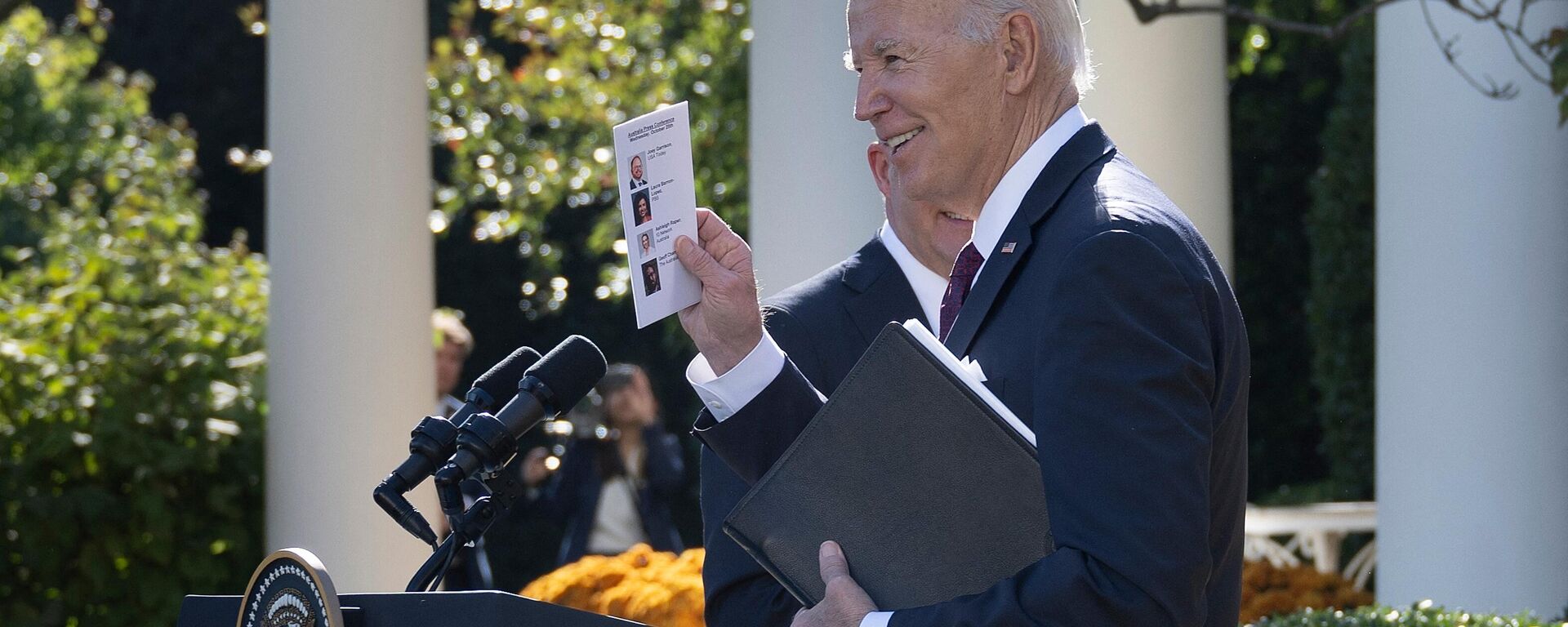https://sputnikglobe.com/20231104/pentagon-unveils-ai-blueprint-for-us-as-global-fears-over-high-tech-threats-rise-1114708501.html
Pentagon Unveils AI Blueprint for US as Global Fears Over High-Tech Threats Rise
Pentagon Unveils AI Blueprint for US as Global Fears Over High-Tech Threats Rise
Sputnik International
Artificial intelligence has become one of the DoD's strategic arms to bolster military operations to foster clarity in decision-making and increase cross-functional activities while addressing tech adoption hurdles and delineating control of lethal weapons to humans.
2023-11-04T11:04+0000
2023-11-04T11:04+0000
2023-11-04T15:51+0000
world
military & intelligence
joe biden
kamala harris
pentagon
us department of defense (dod)
government accountability office
london
congress
https://cdn1.img.sputnikglobe.com/img/07e7/08/0f/1112627811_5:0:1456:816_1920x0_80_0_0_eac5547bad51bca2f7fca81a87f046ab.png
Media sources report that the Pentagon has unveiled a comprehensive new blueprint to steer its implementation of advanced data analytics and artificial intelligence. This strategy underscores a thrust for increased funding in AI-driven technologies, sophisticated algorithmic analysis, and the development of autonomous systems such as unmanned aerial vehicles.The latest framework, an evolved iteration of the initial strategy conceived in 2018, reflects the Department of Defense’s forethought on AI's transformative potential across various industries and its implications for national defense. This revised document incorporates the considerable expansion of AI within the defense sector, as highlighted by the Department of Defense’s chief digital and AI officer, Craig Martell.The Pentagon has also elaborated on its approach to AI governance by creating the Chief Digital and Artificial Intelligence Office (CDAO) in 2021, consolidating such entities as the Joint Artificial Intelligence Center, the Defense Digital Service, the Advana data platform, and the position of the chief data officer.The military's use of generative AI is controversial, particularly for its potential in streamlining tasks and its possible misuse in cyberattacks and misinformation. Deputy Secretary of Defense Kathleen Hicks has asserted that humans will maintain control over decisions involving lethal force and nuclear weapons despite AI's integration, as affirmed by the Pentagon's recent nuclear weapons review. Deputy Secretary Hicks recognizes the potential risks of AI and is committed to minimizing them.This coincides with an AI summit in London, attended by Vice President Harris, and follows President Joe Biden’s executive order on AI security and privacy. Despite Senator Chuck Schumer's efforts, Congress has not legislated on this topic. The Pentagon has requested $1.4 billion for AI for fiscal 2024, and current funding levels are sustained through a continuing resolution through mid-November.Recent briefings obtained by news sources on the just concluded AI Summit have unveiled a litany of potential perils inherent to the rise of artificial intelligence. Notably, these risks encompass the proliferation of false information driven by AI and the troubling prospect of AI interference in electoral systems.Furthermore, such advancements threaten to deepen societal divides and erode trust among the global populace. An underlying concern is that AI could hasten the development of bioweapons or surpass the limits of current safety measures. The media outlets also reported that the summit's draft agenda highlights these issues as critical, marking this period as one that straddles the dual possibilities of unprecedented economic potential and profound peril.However, in May 2023, it was reported that industry leaders had issued a serious warning regarding the existential threat of artificial intelligence, equating its potential risks to pandemics and nuclear war. This sentiment was encapsulated in a statement from the Center for AI Safety, endorsed by over 350 professionals, including key figures such as Dario Amodei of Anthropic, Demis Hassabis of Google DeepMind, Sam Altman of OpenAI, and renowned researchers like Geoffrey Hinton and Yoshua Bengio. The collective concern highlighted the urgency of managing AI dangers, especially in light of recent developments in large language models that have sparked fears over their misuse in spreading misinformation and job displacement.The rapid advancement of AI, including large language models like ChatGPT, has been noted this year, although these have not yet met DoD standards. Despite this, the Pentagon is developing its own models, with some already integrated into regular workflows. The Deputy Secretary of Defense acknowledged that over 180 potential applications for AI have been identified within the DoD, ranging from battlefield analysis to digesting classified data sets, adding to the already significant tally of more than 685 AI-related projects reported by the Government Accountability Office in early 2021.
https://sputnikglobe.com/20231030/biden-to-sign-first-executive-order-on-artificial-intelligence-systems-1114600421.html
london
Sputnik International
feedback@sputniknews.com
+74956456601
MIA „Rosiya Segodnya“
2023
Chimauchem Nwosu
https://cdn1.img.sputnikglobe.com/img/07e7/09/01/1113046371_0:99:1536:1635_100x100_80_0_0_9c5c627283eca931c39fe4852bbb301c.jpg
Chimauchem Nwosu
https://cdn1.img.sputnikglobe.com/img/07e7/09/01/1113046371_0:99:1536:1635_100x100_80_0_0_9c5c627283eca931c39fe4852bbb301c.jpg
News
en_EN
Sputnik International
feedback@sputniknews.com
+74956456601
MIA „Rosiya Segodnya“
Sputnik International
feedback@sputniknews.com
+74956456601
MIA „Rosiya Segodnya“
Chimauchem Nwosu
https://cdn1.img.sputnikglobe.com/img/07e7/09/01/1113046371_0:99:1536:1635_100x100_80_0_0_9c5c627283eca931c39fe4852bbb301c.jpg
pentagon, advanced data analytics, artificial intelligence, ai, autonomous systems, unmanned aerial vehicles, department of defense, craig martell, data quality, infrastructure upgrades, external partnerships, ai governance, chief digital and artificial intelligence office (cdao), cyberattacks, misinformation, directive 3000.09, generative ai, kathleen hicks, task force lima, ai summit, vice president harris, president joe biden, senator chuck schumer, us 2024 fiscal year.
pentagon, advanced data analytics, artificial intelligence, ai, autonomous systems, unmanned aerial vehicles, department of defense, craig martell, data quality, infrastructure upgrades, external partnerships, ai governance, chief digital and artificial intelligence office (cdao), cyberattacks, misinformation, directive 3000.09, generative ai, kathleen hicks, task force lima, ai summit, vice president harris, president joe biden, senator chuck schumer, us 2024 fiscal year.
Pentagon Unveils AI Blueprint for US as Global Fears Over High-Tech Threats Rise
11:04 GMT 04.11.2023 (Updated: 15:51 GMT 04.11.2023) Artificial intelligence has become one of the DoD's strategic arms to bolster military operations to foster clarity in decision-making and increase cross-functional activities while addressing tech adoption hurdles while delegating control of lethal weapons to humans.
Media sources report that the Pentagon has unveiled a comprehensive
new blueprint to steer its implementation of advanced data analytics and artificial intelligence. This strategy underscores a thrust for increased funding in AI-driven technologies, sophisticated algorithmic analysis, and the development of autonomous systems such as unmanned aerial vehicles.
The latest framework, an evolved iteration of the initial strategy conceived in 2018, reflects the Department of Defense’s forethought on AI's transformative potential across various industries and its implications for national defense. This revised document incorporates the considerable expansion of AI within the defense sector, as highlighted by the Department of Defense’s chief digital and AI officer, Craig Martell.

30 October 2023, 18:39 GMT
The Pentagon has also elaborated on its approach to AI governance by
creating the Chief Digital and Artificial Intelligence Office (CDAO) in 2021, consolidating such entities as the Joint Artificial Intelligence Center, the Defense Digital Service, the Advana data platform, and the position of the chief data officer.
The military's use of generative AI is controversial, particularly for its potential in streamlining tasks and its possible
misuse in cyberattacks and misinformation. Deputy Secretary of Defense Kathleen Hicks has asserted that humans will maintain control over decisions involving lethal force and nuclear weapons despite AI's integration, as affirmed by the Pentagon's recent
nuclear weapons review. Deputy Secretary Hicks recognizes the potential risks of AI and is committed to minimizing them.
This coincides with an AI summit in London, attended by Vice President Harris, and follows
President Joe Biden’s executive order on AI security and privacy. Despite
Senator Chuck Schumer's efforts, Congress has not legislated on this topic. The Pentagon has requested $1.4 billion for AI for fiscal 2024, and current funding levels are sustained through a continuing resolution through mid-November.
Recent briefings obtained by news sources on the just concluded AI Summit have unveiled a litany of potential perils inherent to the rise of artificial intelligence. Notably, these risks encompass the proliferation of false information driven by AI and the troubling prospect of AI interference in electoral systems.
Furthermore, such advancements threaten to deepen societal divides and erode trust among the global populace. An underlying concern is that AI could hasten the
development of bioweapons or surpass the limits of current safety measures. The media outlets also reported that the summit's draft agenda highlights these issues as critical, marking this period as one that straddles the dual possibilities of unprecedented economic potential and profound peril.
However, in May 2023, it was reported that industry leaders had issued a serious warning regarding the existential threat of artificial intelligence, equating its potential risks to
pandemics and nuclear war. This sentiment was encapsulated in
a statement from the Center for AI Safety, endorsed by over 350 professionals, including key figures such as Dario Amodei of Anthropic, Demis Hassabis of Google DeepMind, Sam Altman of OpenAI, and renowned researchers like Geoffrey Hinton and Yoshua Bengio. The collective concern highlighted the urgency of managing AI dangers, especially in light of recent developments in large language models that have sparked fears over their misuse in spreading misinformation and job displacement.
The rapid advancement of AI, including
large language models like ChatGPT, has been noted this year, although these have not yet met DoD standards. Despite this, the Pentagon is developing its own models, with some already integrated into regular workflows. The Deputy Secretary of Defense acknowledged that over 180 potential applications for AI have been identified within the DoD, ranging from battlefield analysis to digesting classified data sets, adding to the already significant tally of more than 685 AI-related projects reported by the Government Accountability Office in early 2021.







